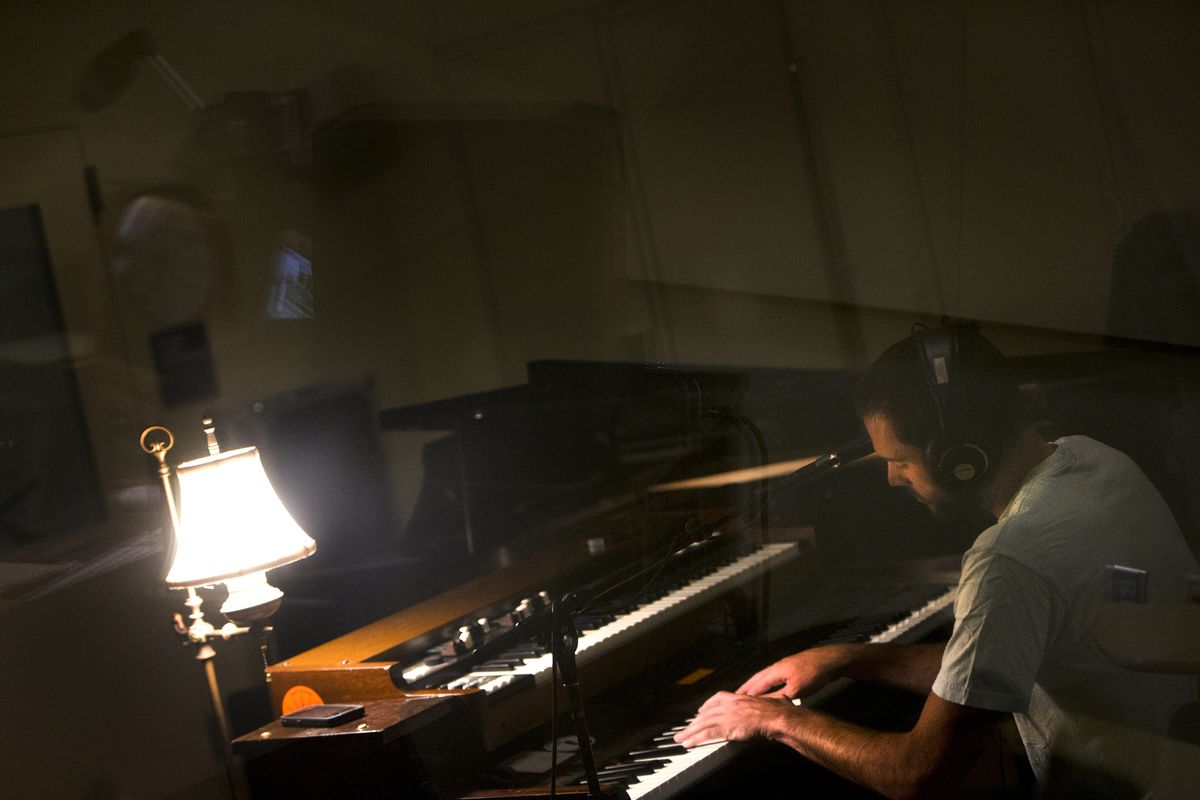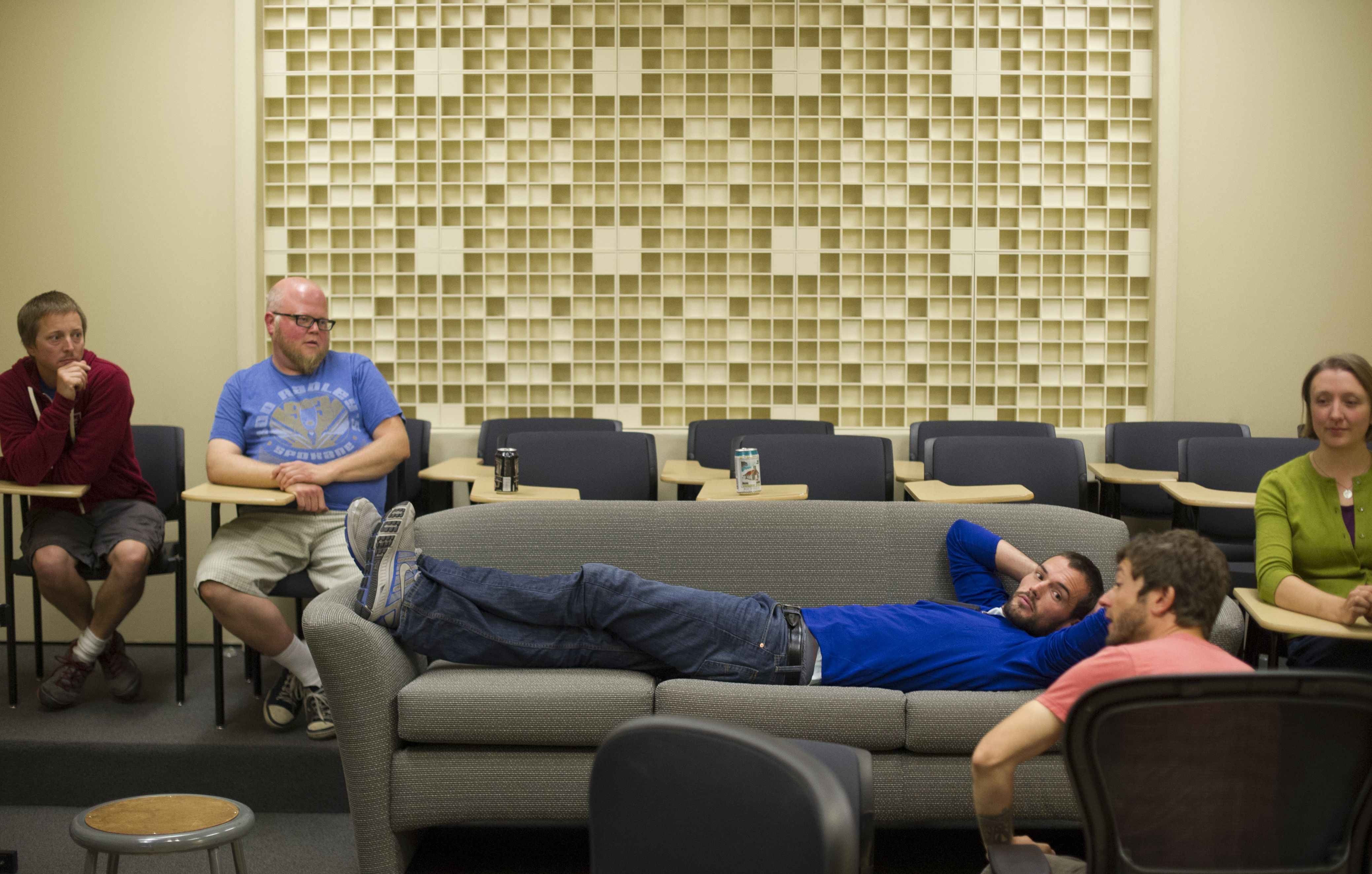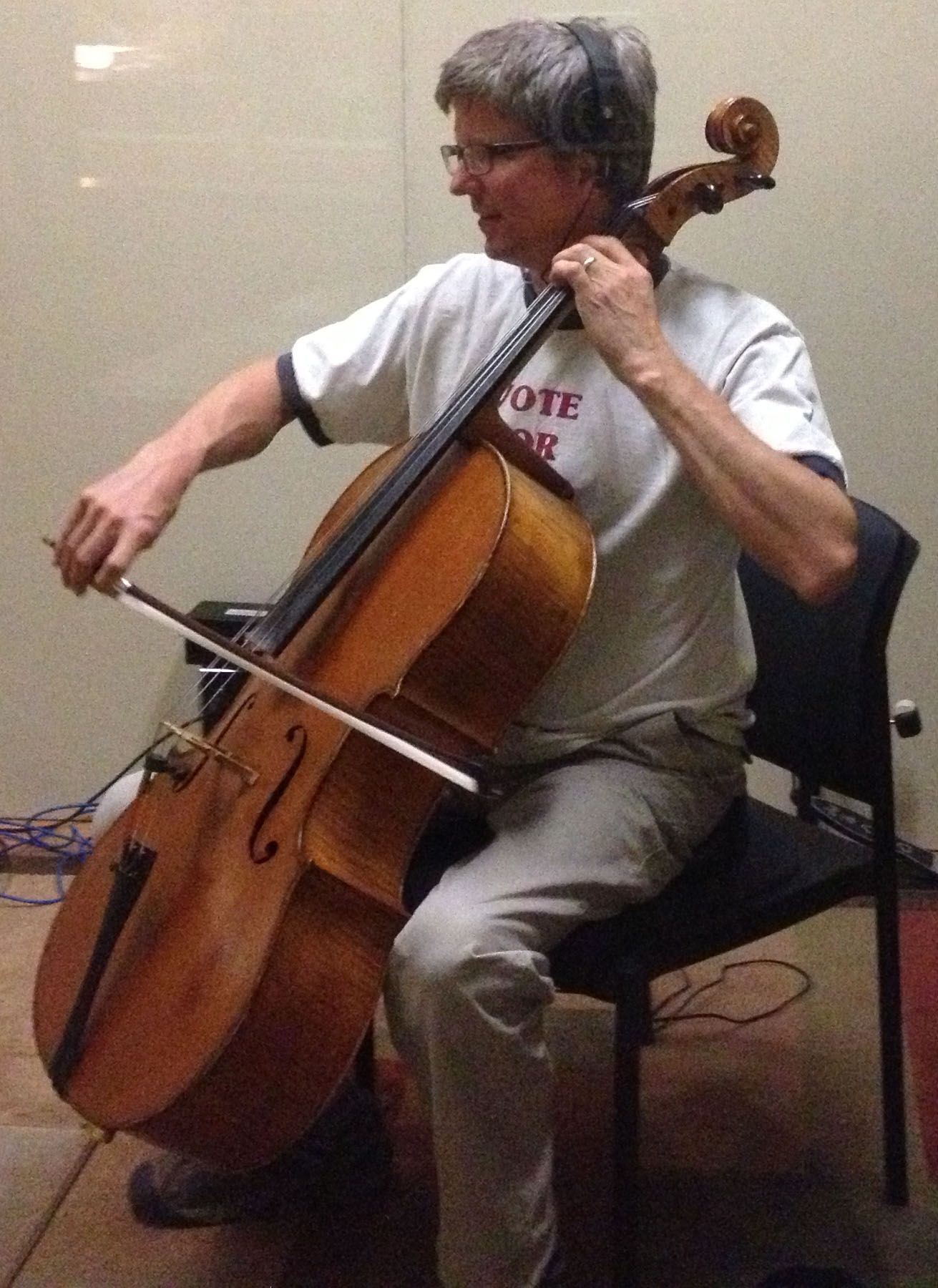Folkinception hopes to capture magic of live shows in recorded work

Matt Mitchell, frontman for the jam-grass band Folkinception, is doing push-ups in the hallway of the Music Building at Spokane Falls Community College.
He’s just outside the school’s recording studio, where the rest of his band is preparing to listen to their latest go at “Knockas das Entradas,” a song they’ve been working on for two hours. Mitchell is just trying to keep the blood flowing while holed up in a cinderblock basement on a beautiful August day.
“Take 175,” audio engineer Steve Gamberoni said after about a dozen takes. He’s kidding, but the band is getting frustrated. They’re recording their first album, “Tower Mountain,” and it’s a different experience from the flow of their live shows, where these six people make it look so easy to belt out tight, energetic tunes drawn from folk, rock and bluegrass. They joke and laugh and take cues from each other with a nod of the head or a smile.
“It’s so easy to play live,” guitarist Jeff Nordvall says at one point, throwing himself onto a couch in the sound room.
They’ve raised $7,000 through a Kickstarter campaign to record this album and they don’t want to disappoint the fans, family members and friends who invested in them. The band has a few weeks to put 11 songs they love down into recorded tracks.
Their strength has always been in their collaboration, but success in the studio depends more on perfecting their individual parts before they can put it back together again, whole.
Who they are
“Why don’t you come down here and say hello/why don’t you come down here/and get to know/get to know me”
– “Curtain Call,” written by Matt Mitchell
Ask the members of Folkinception how they connected with each other and the answer will be something like “I knew them from hanging out at The Lantern.”
Mitchell’s previous band had been practicing at the popular South Perry District tavern. He knew former Lantern owner Nordvall played guitar. So when Mitchell’s band broke up on the eve of a big show two years ago, he turned to Nordvall, who had been jamming on the side with cellist John Bottelli. The three were joined by three others who are no longer in Folkinception. The show went off without a hitch.
In the following months, the band solidified with its current members. Joining Mitchell, Nordvall and Bottelli were Ben Bradley on drums, Heather Montgomery on violin and Seth Carey on bass.

The creative process works like this: Mitchell, the primary singer and songwriter, brings the chords of a song to the group. Since Mitchell is most heavily influenced by Bob Dylan, the songs tend to have a “folk-inception.”
After that, Nordvall said, “we have no idea where it’s going to go.” The other band members write their own parts, drawing from influences ranging from classical to hard rock to blues.
“Matt is the leader, but he would never tell me what the cello part is,” Bottelli said. “We all have a lot of ownership in the songs. It makes people feel invested and valued.”
Mitchell describes their musical style as Americana, roots rock and bluegrass. Songs can start with acoustic guitar and harmonica wailing or with rocking electric guitar solos. Others tease listeners with slow, eerie vocals. Gospel-like keyboards, crashing drums, violin and cello all are used to accompany Mitchell’s lyrics, drawn from his life experiences.
From the start, they agreed the band came second to their families and that they’d work around their jobs. Playing live shows became nights to have fun and blow off steam, Bottelli said. Mitchell, who spent five years touring with another jam-grass band called Ten Mile Tide, said his goal with Folkinception has just been to sound as good as possible. “(We) don’t need to go on tour or get signed.”
“This gets to be the greatest hobby in the world,” Bottelli said. “It’s a wonderful counterbalancing part to each of our lives.”

Into the studio
“You and I will plant a seed/in time everything/will flourish and grow.”
— “Downtime,” written by Matt Mitchell
On a Friday afternoon in August, the band members piled out of a van, carrying amplifiers and instruments in black cases covered with stickers. They wheeled them through the halls of SFCC, down an elevator and finally down a ramp into the bowels of the building, where the recording studio resides.
It was the beginning of a 79 1/2-hour odyssey: A month of nights and weekends away from family, racing from full-time jobs to late nights at the studio then back to their desks in the morning.
“I was a shell of myself,” said Bottelli, the assistant director of Spokane County parks (pictured, right).

The full band played together only during that first weekend, but the goal was to record just the drums and bass. Everything else – the electric and acoustic guitars, mandolin, piano, organ, cello, violin and multiple vocal parts – would be layered on top in individual recordings, over the next few weeks.
Most of the recording featured one musician, alone in the studio, playing take after take until the part was right. Other band members showed up as much as their lives allowed to provide moral support and to ensure the music stayed true to its intent.
“This is hard,” Nordvall said four takes into the first song on the first day. He, Bottelli and Montgomery had never recorded before. Mitchell, Carey and Bradley had.
Two things posed big challenges: They struggled to get used to playing by a metronome, used to more organically playing by ear, taking cues from each other. “It’s sucking the life out of us,” Bradley lamented on the first day.
They also hated that they couldn’t see each other. When they played together, cubicles were set up to isolate the sound of each instrument and Bradley’s drums were in a small, separate room. When recording a part alone, they had to match their part to the music they heard through the headphones.

“I watch him take a breath when we’re on stage and know when to come in,” Montgomery said about harmonizing with Mitchell during live performances. “I can’t do that if it’s just this recording coming through the headphones.” Despite that, by the end of the month, Montgomery (pictured, left) had been nicknamed “the robot,” because she nailed her takes in one or two tries.
As the hours rolled on, the metronome gradually became their friend as it helped them be consistent and find the right speed and beat for each song.
They were initially dismayed when a solo had to be stitched together from more than one take. “You suddenly feel like you’re not as authentic,” Bottelli said, then laughed. “But Steve was like, ‘Get over yourselves guys; this is how it works.’ ”
Before he went into teaching, audio engineer Gamberoni worked in the recording industry with performers such as Usher, Ben Harper and Jerry Lee Lewis. He heads up SFCC’s audio engineering program and set up the recording studio, where he also takes on freelance recording and mixing projects.

The recording process added new effects to some songs, such as crashing thunder at the end of “Tower Mountain Heist,” an instrumental inspired by the South Hill location where Mitchell lives with his wife, Missy. Nordvall sings through a megaphone on “Knockas Das Entradas,” which gives the song a needed edge, Mitchell said, explaining: “Jeff wrote that song when he was in Bosnia looking at all the burned-out buildings.”
Perhaps most touching is the jingling dog collar added to the end of “Before the Pain Arrives.” The song was written by Mitchell and Bottelli using text messaging right after Bottelli’s dog died. Mitchell also was thinking of his aging yellow Labrador, Rufio, who is still alive and whose collar was shaken.
The song is mostly a duet, with Mitchell on guitar and Bottelli on cello, and Bottelli said it was the hardest part for him to write. Mitchell helped him refine it into the track it became 30 minutes before they recorded it.
There were moments of frustration (“There were nights when I couldn’t hit a part,” Mitchell said) and others of pure beauty, like when Bottelli’s wife, Roberta, a cellist with the Spokane Symphony, played on the track, “Curtain Call.”
“She just came in and played the most perfect cello part ever,” Mitchell said. Then she said she wanted to do it again and outdid herself, he added.
On the final night of recording, after the Thursday of Pig Out in the Park, friends from two other bands – the Terrible Buttons of Spokane, and Dead Winter Carpenters of California – joined Folkinception in the studio to sing the chorus and make drunken bar noises for the final track, “More Friends at the Bar.”

They laughed and danced and tried to sound drunk. They modified words slightly for an inside joke. They tried to distract Mitchell as he played piano and sang the rollicking tune.
Then it was over – the song and the recording journey – and they were hugging and high-fiving.
“Love it, love it,” Dave Lockhart, bassist for the Carpenters, said, clapping.
Back to the stage
“The lady still dances/the darkness romances/but the two are no longer at odds/a peace can be found/as they both spin around/together they will carry on.”
– “Dancer and the Darkness,” written by Matt Mitchell
Folkinception’s CD release party will be held Feb. 1 at The Bartlett in downtown Spokane. The band members are feeling a little nervous, hoping they’ll sound as good as they do on their album.
“Steve sprinkled his Steve dust on and everything sounds amazing,” Nordvall said of the album’s mixing.
But they know if the album sounds amazing, it’s because they sound amazing. They wrote and played every note. It sounds more polished than their live sound, but their live shows have more substance, Mitchell said.

“I feel like this album has come out with a really great re-creation of what we do,” said Bradley (pictured, left). “I feel like that energy and that emotion is there.”
Now they want to get new equipment to enhance their performances. They want to gradually acquire equipment to record on their own time frame. Nordvall said he feels like a “better musician coming out of it than going in.”
Despite stories they’ve all heard that “the studio kills the band,” Bottelli said, they came out of the process feeling closer. “It was a time to appreciate each other and what everyone brings to the band,” Carey said.
“I’m just excited to have some recordings of some of Matt’s songs because they’re so great and they’ll reach more people now,” Montgomery said.
“There will be people, like at my school, I can say to the secretary, ‘Here’s my CD,’ and she might come listen to us live,” said Montgomery, who teaches music and orchestra in Spokane middle schools.
“Because people don’t know. When you say you’re in a band, they’re like, ‘Yeah, whatever.’ But then somebody will come and say, ‘Oh. You’re actually good.’ ”